Jakob Weissteiner
Prices, Bids, Values: Everything, Everywhere, All at Once
Nov 14, 2024



Abstract:We study the design of iterative combinatorial auctions (ICAs). The main challenge in this domain is that the bundle space grows exponentially in the number of items. To address this, several papers have recently proposed machine learning (ML)-based preference elicitation algorithms that aim to elicit only the most important information from bidders to maximize efficiency. The SOTA ML-based algorithms elicit bidders' preferences via value queries (i.e., "What is your value for the bundle $\{A,B\}$?"). However, the most popular iterative combinatorial auction in practice elicits information via more practical \emph{demand queries} (i.e., "At prices $p$, what is your most preferred bundle of items?"). In this paper, we examine the advantages of value and demand queries from both an auction design and an ML perspective. We propose a novel ML algorithm that provably integrates the full information from both query types. As suggested by our theoretical analysis, our experimental results verify that combining demand and value queries results in significantly better learning performance. Building on these insights, we present MLHCA, the most efficient ICA ever designed. MLHCA substantially outperforms the previous SOTA in realistic auction settings, delivering large efficiency gains. Compared to the previous SOTA, MLHCA reduces efficiency loss by up to a factor of 10, and in the most challenging and realistic domain, MLHCA outperforms the previous SOTA using 30% fewer queries. Thus, MLHCA achieves efficiency improvements that translate to welfare gains of hundreds of millions of USD, while also reducing the cognitive load on the bidders, establishing a new benchmark both for practicability and for economic impact.
Machine Learning-powered Combinatorial Clock Auction
Aug 20, 2023Abstract:We study the design of iterative combinatorial auctions (ICAs). The main challenge in this domain is that the bundle space grows exponentially in the number of items. To address this, several papers have recently proposed machine learning (ML)-based preference elicitation algorithms that aim to elicit only the most important information from bidders. However, from a practical point of view, the main shortcoming of this prior work is that those designs elicit bidders' preferences via value queries (i.e., ``What is your value for the bundle $\{A,B\}$?''). In most real-world ICA domains, value queries are considered impractical, since they impose an unrealistically high cognitive burden on bidders, which is why they are not used in practice. In this paper, we address this shortcoming by designing an ML-powered combinatorial clock auction that elicits information from the bidders only via demand queries (i.e., ``At prices $p$, what is your most preferred bundle of items?''). We make two key technical contributions: First, we present a novel method for training an ML model on demand queries. Second, based on those trained ML models, we introduce an efficient method for determining the demand query with the highest clearing potential, for which we also provide a theoretical foundation. We experimentally evaluate our ML-based demand query mechanism in several spectrum auction domains and compare it against the most established real-world ICA: the combinatorial clock auction (CCA). Our mechanism significantly outperforms the CCA in terms of efficiency in all domains, it achieves higher efficiency in a significantly reduced number of rounds, and, using linear prices, it exhibits vastly higher clearing potential. Thus, with this paper we bridge the gap between research and practice and propose the first practical ML-powered ICA.
Machine Learning-powered Course Allocation
Oct 03, 2022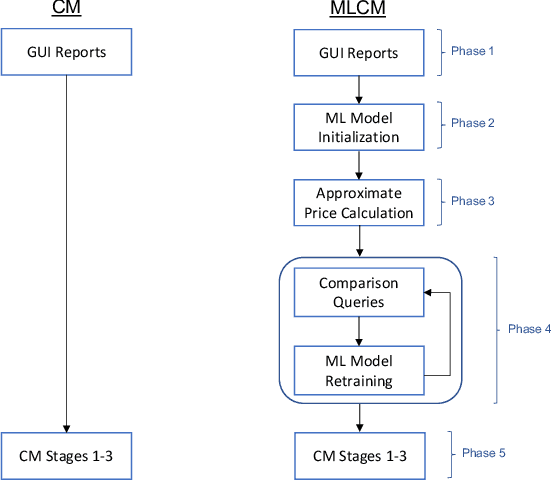

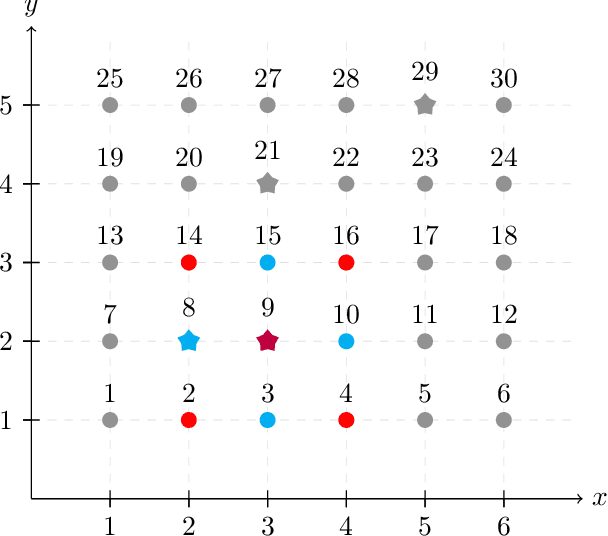

Abstract:We introduce a machine learning-powered course allocation mechanism. Concretely, we extend the state-of-the-art Course Match mechanism with a machine learning-based preference elicitation module. In an iterative, asynchronous manner, this module generates pairwise comparison queries that are tailored to each individual student. Regarding incentives, our machine learning-powered course match (MLCM) mechanism retains the attractive strategyproofness in the large property of Course Match. Regarding welfare, we perform computational experiments using a simulator that was fitted to real-world data. We find that, compared to Course Match, MLCM is able to increase average student utility by 4%-9% and minimum student utility by 10%-21%, even with only ten comparison queries.
Bayesian Optimization-based Combinatorial Assignment
Aug 31, 2022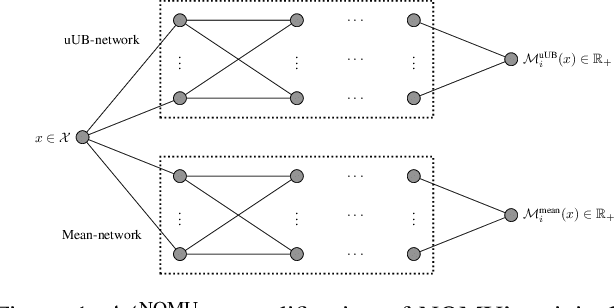

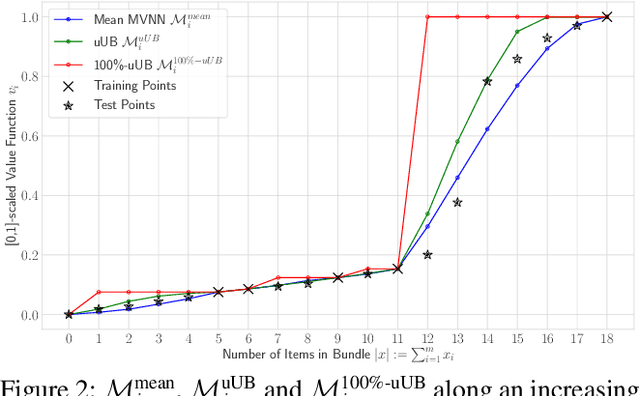

Abstract:We study the combinatorial assignment domain, which includes combinatorial auctions and course allocation. The main challenge in this domain is that the bundle space grows exponentially in the number of items. To address this, several papers have recently proposed machine learning-based preference elicitation algorithms that aim to elicit only the most important information from agents. However, the main shortcoming of this prior work is that it does not model a mechanism's uncertainty over values for not yet elicited bundles. In this paper, we address this shortcoming by presenting a Bayesian Optimization-based Combinatorial Assignment (BOCA) mechanism. Our key technical contribution is to integrate a method for capturing model uncertainty into an iterative combinatorial auction mechanism. Concretely, we design a new method for estimating an upper uncertainty bound that can be used as an acquisition function to determine the next query to the agents. This enables the mechanism to properly explore (and not just exploit) the bundle space during its preference elicitation phase. We run computational experiments in several spectrum auction domains to evaluate BOCA's performance. Our results show that BOCA achieves higher allocative efficiency than state-of-the-art approaches.
NOMU: Neural Optimization-based Model Uncertainty
Mar 03, 2021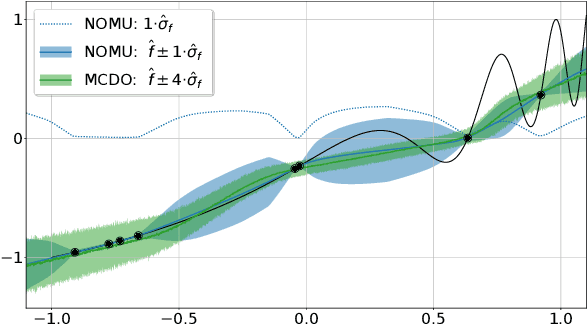

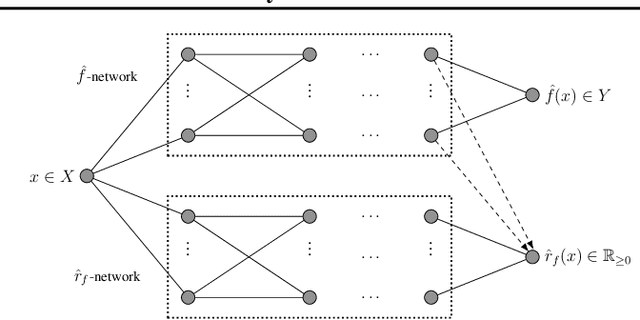
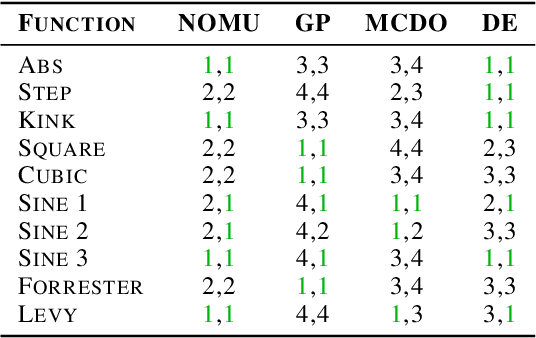
Abstract:We introduce a new approach for capturing model uncertainty for neural networks (NNs) in regression, which we call Neural Optimization-based Model Uncertainty (NOMU). The main idea of NOMU is to design a network architecture consisting of two connected sub-networks, one for the model prediction and one for the model uncertainty, and to train it using a carefully designed loss function. With this design, NOMU can provide model uncertainty for any given (previously trained) NN by plugging it into the framework as the sub-network used for model prediction. NOMU is designed to yield uncertainty bounds (UBs) that satisfy four important desiderata regarding model uncertainty, which established methods often do not satisfy. Furthermore, our UBs are themselves representable as a single NN, which leads to computational cost advantages in applications such as Bayesian optimization. We evaluate NOMU experimentally in multiple settings. For regression, we show that NOMU performs as well as or better than established benchmarks. For Bayesian optimization, we show that NOMU outperforms all other benchmarks.
 Add to Chrome
Add to Chrome Add to Firefox
Add to Firefox Add to Edge
Add to Edge